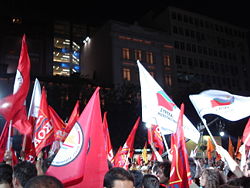- Coalition of the Radical Left
-
Συνασπισμός Ριζοσπαστικής Αριστεράς
Synaspismós Rizospastikís Aristerás
Coalition of the Radical Left
Leader Alexis Tsipras Founded 2004 Headquarters 1 Eleftherias Square,
105 53 AthensIdeology Democratic socialism[1],
Anti-capitalism[2],
Eco-socialism,
Social progressivism, Revolutionary socialism,
EurocommunismPolitical position Left-wing International affiliation None European affiliation Party of the European Left (member), European Anticapitalist Left (observer) European Parliament Group European United Left–Nordic Green Left Official colours Yellow Parliament 9 / 300European Parliament 1 / 22Peripheries [3] 17 / 725Website syriza.gr Politics of Greece
Political parties
ElectionsThe Coalition of the Radical Left (Greek: Συνασπισμός Ριζοσπαστικής Αριστεράς, Synaspismós Rizospastikís Aristerás), commonly known by its Greek abbreviation ΣΥΡΙΖΑ (SYRIZA), is a coalition of left political parties in Greece. In 2007–2009 its parliamentary leader was Alekos Alavanos, former president of Synaspismos, the largest party to be a member of the coalition.
Contents
History
Formation
Although SYRIZA is typically regarded to have been launched before the legislative election of 2004, the process that ended up in its formation can be traced back to the Space for Dialogue for the Unity and Common Action of the Left (Greek: Χώρος Διαλόγου για την Ενότητα και Κοινή Δράση της Αριστεράς) in 2001.[4] The "Space" was composed of various organizations of the Greek Left that, despite different ideological and historical backgrounds, shared common political action in several important issues that had risen in Greece at the end of the 1990s, such as the Kosovo War, privatizations, social rights, etc.
The "Space" provided the common ground from which the participating parties could work together on issues such as:
- Neoliberal reform of the pension and social security systems
- Opposition to new anti-terrorist laws
- The preparation of the Greek participation at the 2001 international demonstration in Genoa.[5]
Even though the "Space" was not a political organization, but rather an effort to bring together the parties and organizations that attended, it gave birth to some electoral alliances for the local election of 2002,[6] the most successful being the one led by Manolis Glezos for the super-prefecture of Athens-Piraeus. The "Space" also provided the common ground from which several of the member parties and organizations launched the Greek Social Forum[7], part of the larger European Social Forum.
2004 general election
The defining moment for the birth of SYRIZA came with the legislative election of 2004. Most of the participants of the "Space", sought to develop a common platform that could lead to an electoral alliance.[8] This led to the eventual formation of the Coalition of the Radical Left, in January 2004.[9]
The parties that originally formed the Coalition of the Radical Left in January 2004 were:
- Synaspismos (SYN)
- Renewing Communist Ecological Left (AKOA)
- Internationalist Workers Left (DEA)
- Movement for the United in Action Left (KEDA) (a split of the Communist Party of Greece)
- Active Citizens (a political organisation associated with Manolis Glezos)
- Other independent left-wing groups or activists
Although the Communist Organization of Greece (KOE) had participated in the "Space", it decided not to take part in the Coalition.[10]
In the election, the Coalition gathered 241,539 votes (3.3% of the total) and elected six members to parliament. All six were members of Synaspismos, the largest of the coalition parties. This led to much tension within the Coalition.
Crisis and revitalization
After the 2004 election, the smaller parties accused Synaspismos of not honoring an agreement, to have one of its members of parliament resign so that Yannis Banias of AKOA would take his seat.[11] Tension built up and resulted in the split of the Internationalist Workers Left and the formation of Kokkino, both of which remained within the Coalition. The frame of the crisis within SYRIZA was the reluctance of Synaspismos to adopt and keep the political agreement for a clear denial of "Centre-left politics".
Three months after the legislative election, Synaspismos chose to run independently from the rest of the Coalition for the 2004 elections for the European Parliament and some of the smaller parties of the Coalition supported the feminist Women for Another Europe (Greek: Γυναίκες για μια άλλη Ευρώπη) list.[12].
The crisis ended in December 2004 with the 4th convention of Synaspismos, when the large majority within the party voted for the revitalization of the Coalition.[13] This change of attitude was further intensified with the election of Alekos Alavanos, a staunch supporter of the Coalition,[14] as president of Synaspismos, after its former leader, Nikos Konstantopoulos stepped down.
The Coalition solidified further with the successful organization of the 4th European Social Forum in May 2006 in Athens, as well as with a number of largely successful coalition tickets, such as in Athens and Piraeus, for the 2006 local election. The ticket for the municipality of Athens was led by the 30 year old Alexis Tsipras, proposed by Alavanos who declared Synaspismos's "opening to the new generation".
2007 general election
The Coalition of the Radical Left was the big surprise in the 2007 Greek legislative election (16 September 2007), increasing their votes by 120,000 and gaining an unexpected 5,04%. Opinion polls had already indicated that the Coalition was expected to make significant gains in the election, with predictions ranging from 4% to 5% of the electorate.[15]
Prior to the election, in 22 June, the participating parties had agreed on a common declaration. The signed Declaration of the Coalition of the Radical Left, outlined the common platform on which the Coalition would compete in the following election and outlined the basis for the political alliance.[16]
The Coalition of 2007 has also expanded from its original composition in 2004. On 20 June 2007, the Communist Organization of Greece (KOE) announced its participation into the Coalition.[17] On August 21 the environmentalist Ecological Intervention (Greek: Οικολογική Παρέμβαση), also joined,[18] and on 22 August 2007, the Democratic Social Movement (DIKKI), also announced its own participation to the Coalition.[19]
On 2 September The Areios Pagos refused to include the title of DIKKI in the electoral alliance of SYRIZA claiming that the internal procedures followed by DIKKI were flawed. This was criticised furiously by SYRIZA and DIKKI as inappropriate interference in party political activity on behalf of the courts.[20]
Participating parties
With the aforementioned additions, the Coalition currently comprises the following parties (in alphabetical order):[21]
- Active Citizens (Ενεργοί Πολίτες), Democratic Socialism, Patriotism
- Communist Organization of Greece (KOE), Maoism, Communism
- Democratic Social Movement (DIKKI), Social democracy, Socialism
- Ecosocialists of Greece, Eco-socialism, Left Ecology
- Internationalist Workers' Left (DEA), Revolutionary socialism, Communism, Trotskyism
- Red (Κόκκινο), Communism, Trotskyism
- Movement for the United in Action Left (KEDA), Communism
- Renewing Communist Ecological Left (AKOA), Democratic socialism, Eurocommunism, Green
- Radical Left Group Roza
- Synaspismos (SYN), Democratic socialism, Eurocommunism, Renewalism, Green, Eco-socialism, Social progressivism, Alter-globalization
- Xekinima - Socialist Internationalist Organisation(CWI), Marxism, Trotskyism
- and several independent leftist activists
Electoral results
Results since 2004
(year links to election page)Year Type of Election Votes % MPs 2004 Parliament 241,539 3.26% 6 2007 Parliament 361,211 5.04% 14 2009 European Parliament 240,898 4.70% 1 2009 Parliament 315,627 4.60% 13 (now 9) Parliamentary representation
SYRIZA currently occupies 9 seats in the Greek parliament. Given that the coalition's support is higher in the major cities, most of their MPs come from the metropolitan areas of Athens, Piraeus and Thessalonica.
- National list: Vassilis Moulopoulos
- Athens A (city): Alexis Tsipras
- Athens B (suburban area): Dimitrios Papadimoulis
- Piraeus A (city): Thodoris Dritsas
- Piraeus B (suburban area): Panagiotis Lafazanis
- Thessalonica A (city): Tasos Kourakis
- Thessalonica B (prefecture, excl. city of Thessalonica): Litsa Ammanatidou-Pashalidou
- Heraklion: Mihalis Kritsotakis
- Larissa: Iro Dioti
Another 4 MPs had been elected under the flag of SYRIZA in the last elections, but since June 2010 they don't belong to the coalition's parliamentary group. Being members or sympathizers of Ananeotiki ("Renewing Wing" - SYN's socialdemocratic platform), they declared themselves independent a few days after the party's 6th Congress rejected Ananeotiki's demands to disband SYRIZA[22][23]. The four MPs are:
- Athens B (suburban area): Fotis Kouvelis, Grigoris Psarianos
- Attica (excl. Athens, Piraeus and suburbs): Thanasis Leventis
- Achaea: Nikos Tsoukalis
European parliament
SYRIZA holds 1 seat in the European parliament
- Nikos Hountis
Recent developments
In 27 November 2007, Alavanos announced that he would not apply for a renewal of his presidency of Synaspismos, due to private reasons.[24] The 5th party congress of Synaspismos elected 33 year old Alexis Tsipras for party president in 10 February 2008. Alavanos retained the parliamentary leadership of SYRIZA, as Tsipras currently serves as a municipal councilman for the municipality of Athens. However, Tsipras has achieved considerable popularity with the Greek electorate, which has led to a significant increase in support for SYRIZA in opinion polls, as much as 18 percent.[25]
In end of June 2008, Xekinima announced that it would join the coalition.[26]
During the run-up to the European Parliament election, 2009 SYRIZA, amid turbulent internal developments, saw its polling numbers dive to a final 4,7%, an unexpected result that sent only one SYRIZA candidate (Nikos Hountis) to the European Parliament. This caused renewed internal strife, leading to the resignation of former Synaspismos president Alekos Alavanos from his seat in the Greek parliament, a resignation that was however recalled in a few days [27].
In Greek legislative election, 2009 SYRIZA ,rather unexpectedly, retained its strength and returned 13 MPs to the Greek parliament.
References
- ^ http://www.parties-and-elections.de/greece.html
- ^ http://www.parties-and-elections.de/greece.html
- ^ The counselors of the Peripheries.
- ^ Press conference of the "Space", May 2001
- ^ Overcoming division, article by Georges Mitralias, June 2001
- ^ A catalogue of such electoral alliances
- ^ Greek Social Forum
- ^ Synaspismos press release, 17 December 2003
- ^ 15/01/2004 article from the Greek language edition of the BBC
- ^ Koel press release, February 2004
- ^ 28/09/2004 article by the newspaper Epohi
- ^ 23/05/2004 article by the newspaper Epohi
- ^ Chapter 9 of the Political Decisions of the 4th convention of Synaspismos
- ^ Alavanos' main convention speech at the convention
- ^ See the relevant Wikipedia entry
- ^ Full text of the Declaration
- ^ news in.gr - Στον ΣΥΡΙΖΑ προσχώρησε η Κομμουνιστική Οργάνωση Ελλάδας
- ^ Ecological Intervention press release
- ^ DIKKI press release
- ^ 2/9/2007 DIKKI press release
- ^ List of participants from the Coalition's website
- ^ The 4 MP's of Ananeotiki declare themselves independent, newspaper Eleftherotypia, on-line edition of June 9th, 2010
- ^ Press release of June 10, 2010, official site of Ananeotiki
- ^ Synaspismos press release
- ^ Governing New Democrats Still Lead in Greece, Angus Reid article.
- ^ Χριστίνα Ζιάκα (2008-06-10). "Απόφαση του Ξεκινήματος για συμμετοχή στο Συριζα" (in Greek). Ξεκίνημα. http://www.xekinima.org/news/display.php?tbl=news&id=604. Retrieved 2008-06-15.
- ^ Alavanos reverses decision | ANA
External links
- Coalition of the Radical Left
- Active Citizens
- Communist Organization of Greece
- Democratic Social Movement
- Ecological Intervention
- Internationalist Workers Left
- Kokkino
- Movement for the United in Action Left
- Popular Unions of Bipartisan Social Groups
- Renewing Communist Ecological Left
- Synaspismos
- Xekinima
 Political parties in Greece
Political parties in GreeceParties represented in the
Hellenic Parliament (300 seats)Panhellenic Socialist Movement (153) · New Democracy (83) · Communist Party (21) · Popular Orthodox Rally (16) · Radical Left Coalition (9) · Democratic Alliance (4) · Democratic Left (4) · Panhellenic Citizen Chariot (1) · Free Citizens (1) · Independents (8)Parties not represented Communist Party (Marxist–Leninist) · Democratic Revival · Drasi · Ecologists Greece · Ecologist Greens · Fighting Socialist Party · Front of the Greek Anticapitalist Left · Greek Ecologists · Greek Unity · Golden Dawn · Liberal Alliance · Liberal Party · Marxist-Leninist Communist Party · Movement for the Reorganization of the Communist Party · Organization for the Reconstruction of the Communist Party · Party of Friendship, Equality and Peace · Party of Greek Hunters · Patriotic Humanitarian Movement · Rainbow Party · Union of Centrists · Workers Revolutionary PartyCategories:- Greek party coalitions
- 2004 establishments in Greece
Wikimedia Foundation. 2010.



